De passage à Paris pour entamer sa tournée solo, Peter Doherty nous a accordé un peu de son temps pour parler de son nouvel album Felt Better Alive. Décontracté et accompagné de ses deux chiens, il nous a accueilli dans les loges du Trianon avec son verre de jus d’orange et sa banane. Assurément, il va plus que très bien ! Au programme de cette interview : Baron, Tom Hanks, Nîmes et Frank Sinatra
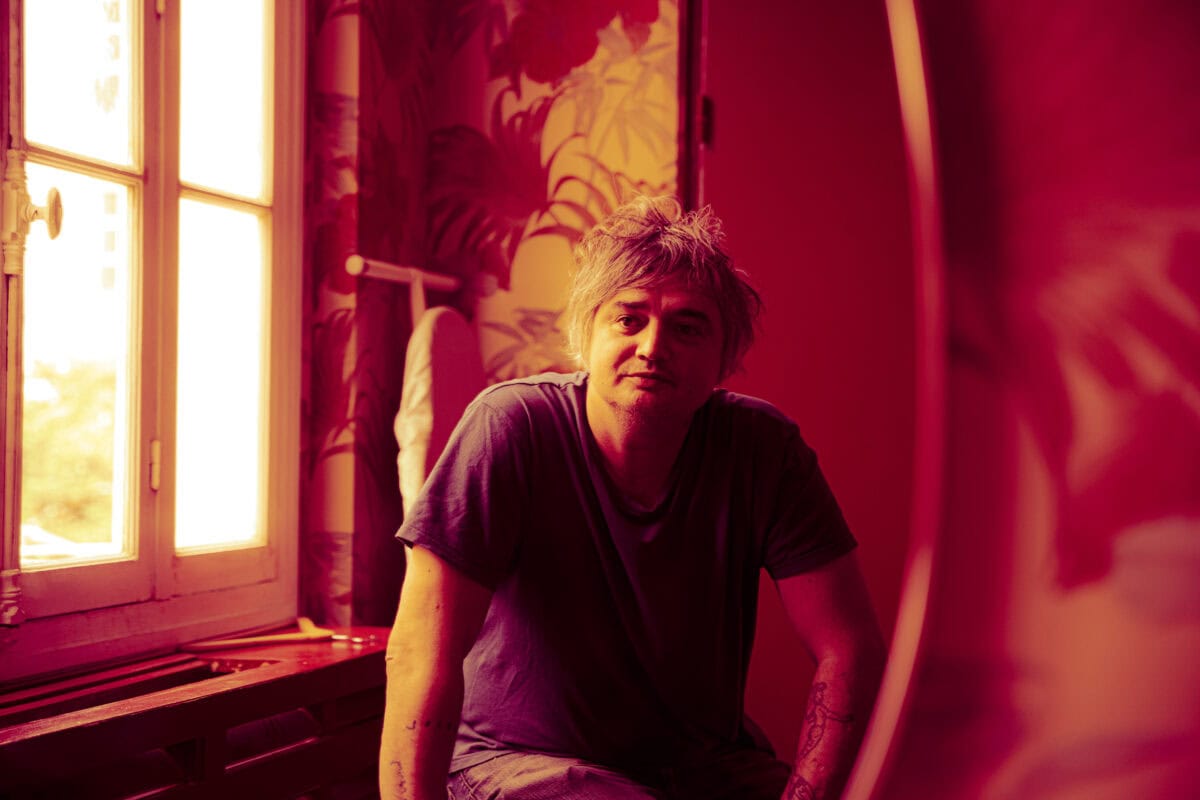
ENGLISH VERSION BELOW
La Face B : Salut Pete, avant toute chose, comment vas-tu ?
Peter Doherty : Je vais très bien, vraiment. C’est une joie exquise d’être ici, dans cet endroit incroyable, de remonter sur scène à Paris… et de montrer ce qu’on a dans le ventre, avec Mike Joyce à la batterie ce soir. C’est comme un rêve !
La Face B : Ton nouvel album s’appelle Felt Better Alive. Est-ce que tu dirais que ça reflète ton état d’esprit actuel ? Tu vis tes meilleurs jours ?
Peter Doherty : Difficile à dire, non ? C’est toujours délicat de comparer les époques de sa vie. Et toi, tu dirais que tu vis ta meilleure vie aujourd’hui ?
La Face B : Je pense que oui. Mais peut-être que je le pensais aussi il y a dix ans. Et toi, aujourd’hui, tu sembles en meilleure forme, non ?
Peter Doherty : En forme… pas tout à fait, mais en meilleure forme, oui sous certains aspects. Je ne veux pas trop m’attarder là-dessus. On passe à la suite ?
La Face B : Chaque morceau de l’album évoque une facette de ta nouvelle vie. Il y a un bel hommage à la Normandie…
Peter Doherty : Oui, c’est vrai.
La Face B : Comment ce nouvel environnement a influencé ta manière de créer ? Tu es devenu un vrai fan de la région ?
Peter Doherty : J’habite en Normandie depuis un moment maintenant, et je suis tombé amoureux du coin — comme de toute la France, d’ailleurs. Un journaliste m’a demandé récemment : « Est-ce que la France t’a sauvé ? » C’est une question assez chargée… Peut-être bien. Mais je ne pense pas que ça ait changé ma manière d’écrire. Je suis encore très enfermé dans ma bulle. Même si je ne vis plus en ville, je continue de lire les mêmes journaux, de m’informer comme avant. Cela dit, quand je sors, je me rends compte à quel point c’est paisible et beau — idéal pour mes chiens aussi. C’est un cadre inspirant. Calvados, par exemple, c’est une chanson d’amour, d’une certaine manière.
La Face B : Dans The Day the Baron Died, qui est le Baron ? Est ce le même que dans la chanson des Libertines ?
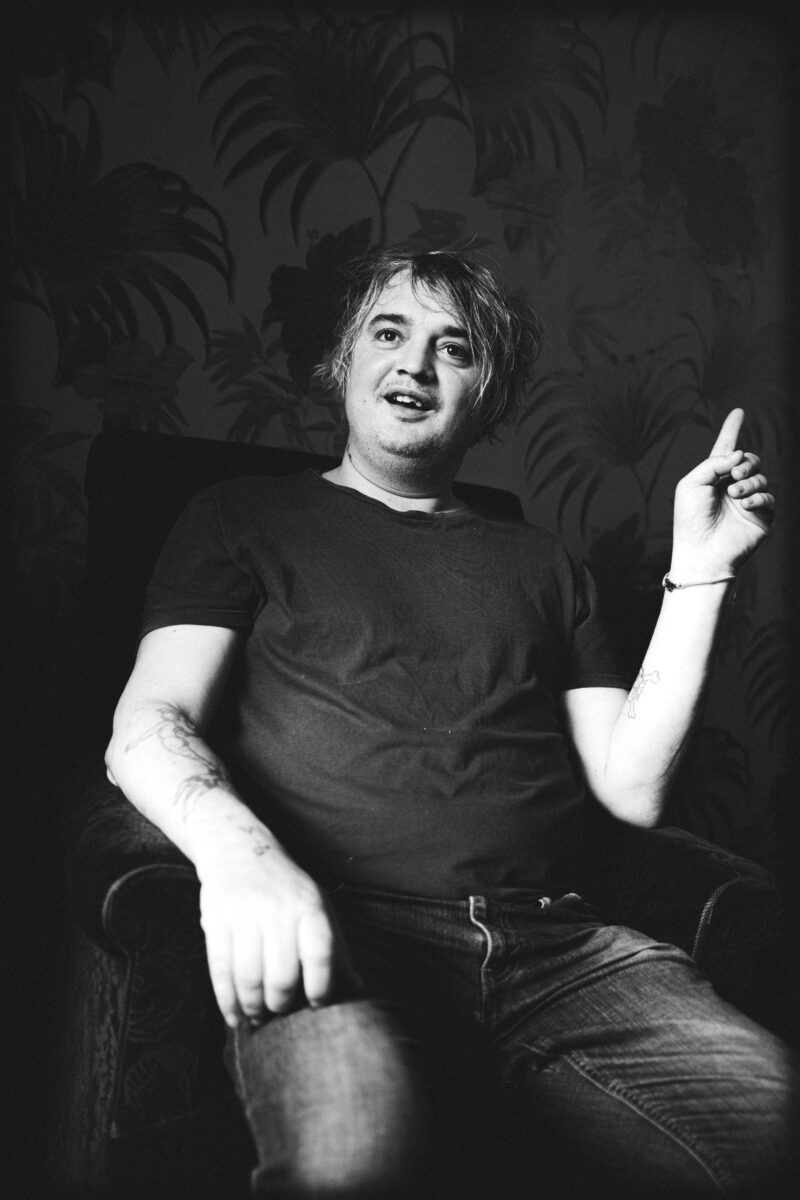
Peter Doherty : Non, pas vraiment. Le Baron des Libertines avait un côté plus sombre. Avec Carl, on a essayé d’écrire une pièce radiophonique autour de ce personnage. Le vrai Baron, c’est juste un type qui vivait dans une vieille maison au bord d’une falaise. Personne ne savait vraiment qui il était ni d’où il venait. À l’ère du tout-numérique, où on peut retrouver n’importe quelle info en un clic, lui, il n’existait nulle part. Zéro empreinte digitale. C’était troublant.
La Face B : Il ne trouve pas sa place dans ce monde ?
Peter Doherty : Disons que lui a trouvé sa place, mais le monde, lui, ne sait pas où le mettre. Ceux qui veulent le connaître finissent par reculer… comme s’ils n’en avaient pas vraiment envie.
La Face B : Il refuse d’être connu ?
Peter Doherty : Oui. Et pourtant, il a toujours été là pour aider les autres. Il aime les petites interactions, les flirts discrets…
La Face B : En fait, ce Baron, c’est toi ?
Peter Doherty (rire) : Tu sais quoi ? Je commence à le croire. Je vais peut-être adopter cette version !
La Face B : Petit jeu maintenant : vrai ou faux. Tu m’expliques ensuite. Pot of Gold est un hommage à ta fille ?
Peter Doherty : Vrai. C’est une sorte de reprise du chant Mockingbird, tu sais… (il chante) « Papa’s gonna buy you a mockingbird ». J’ai gardé la mélodie, changé les paroles.
La Face B : Ed Belly, c’est une auto-dérision sur ton poids ?
Peter Doherty : Exactement. Vrai ! (rires)
La Face B :Empty Room parle de ta peur de la solitude ?
Peter Doherty : Non, c’est plutôt l’inverse. C’est une chanson sur le besoin de trouver cinq minutes de calme, tout seul. Non, non, je ne crains pas la solitude. Je crois à la communauté, aux liens profonds entre deux âmes. Mais je pense aussi qu’il est important d’avoir des moments à soi. On a tous un peu ce fantasme à la Robinson Crusoé, ce désir de solitude physique.
Tu vois, comme dans le film avec Tom Hanks (Seul au monde) ! C’est une histoire magnifique, elle me brise le cœur. Surtout parce que le personnage était facteur de métier. Il était ponctuel, il prenait son travail très à cœur. Et tout est chamboulé.
Mais aujourd’hui, c’est devenu impossible de s’isoler de façon aussi intense. Il n’y a plus d’île déserte.
La Face B : Tu rêves d’être sur une île toi aussi ?
Peter Doherty : Pas vraiment. Mais c’est comme ces émissions où tu dois apprendre à survivre sur une île. C’est ce qu’on a fait pendant des milliers d’années : pêcher, chasser, se débrouiller. Maintenant, c’est devenu une sorte de fantasme. Pareil avec les films post-apocalyptiques. Quand tout s’effondre, on a un bref aperçu de ce que ça pourrait être… Comme pendant la pandémie. Les villes étaient vides. Et on se demande alors : combien de temps faudrait-il pour qu’un arbre pousse au milieu d’une autoroute ? La nature revient très vite. Même sur le béton.
La Face B : Tu penses que tu survivrais à l’apocalypse ?
Peter Doherty : (il désigne son chien, qui dort à ses pieds) Elle, oui. C’est sûr ! (rires) Je reste avec elle !
La Face B : Après toutes ces années passées en France, est-ce que tu te sens plus français que britannique ?
Peter Doherty : Pas vraiment. Mon français n’est pas génial, et quelque part, ça me va. Par exemple, j’aime bien m’asseoir avec mon chien dans un coin tranquille. Je le fais souvent. Et j’aime ne pas tout comprendre autour de moi. J’aime ce flou, cette distance. C’est ça que j’aime ici. J’essaie toujours de communiquer, bien sûr. Et en même temps, je suis complètement lié à cette vie : c’est ma famille, ma fille est française maintenant… (il se lève pour jeter sa banane à la poubelle)
Je ne sais pas vraiment ce que ça veut dire « se sentir français ». Je suis né en Angleterre, je reste profondément anglais. Et vivre en France m’a même rendu encore plus anglais, je pense. Il y a une certaine idée de ce que c’est qu’être anglais.
La Face B : Tu as gardé l’esprit britannique, mais tu vis comme un Français maintenant ?
Peter Doherty : Plus ou moins… Mais je pense qu’on ne peut pas vraiment généraliser les Français. Les hommes français, par exemple, c’est un genre difficile à enfermer dans une case. Il y a une forte identité masculine en France.
La Face B : Dans quel sens ?
Peter Doherty : Je préfère ne pas trop analyser ça, sinon je vais finir par dire une connerie que je regretterai. (rires)
La Face B : T’inquiète, les Français ne t’en voudront pas.
Peter Doherty : Non non, je ne le dis pas de façon insultante. Mais je ne pense qu’on ne pourrait jamais me prendre pour un Français. Imaginons un groupe de gamins de huit ou neuf ans… Tu me désignes du doigt, tu leur dis « observe-le 30 secondes, écoute-le »… ils sauraient tout de suite que je ne suis pas d’ici. Même si je parle français. Si je m’approchais d’eux et que je disais : « Excusez-moi… Qu’est-ce que tu en penses ? Je suis Français ou pas ? » — ils le sauraient.
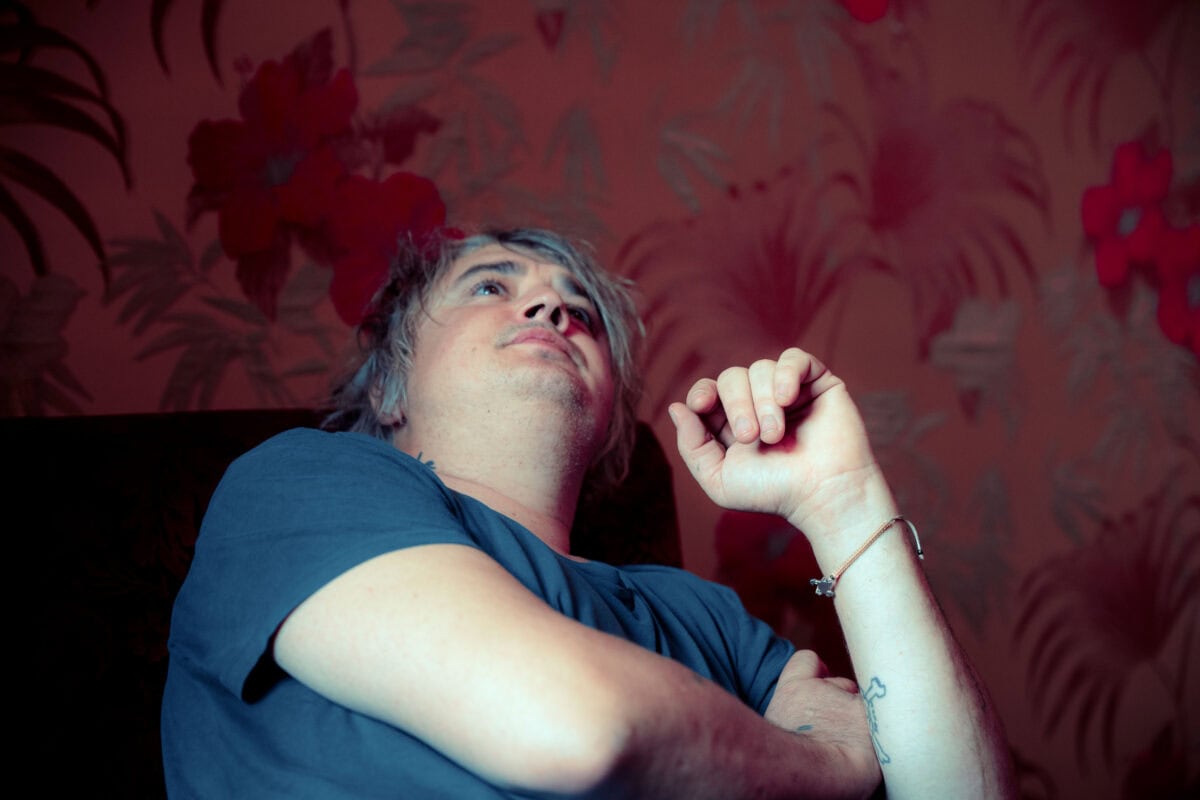
La Face B : À dix ans, tu pourrais peut-être les convaincre. Qui t’accompagne sur scène pour cette tournée, à part Mike Joyce des Smiths ?
Peter Doherty : Mike Jones ! T’imagines ? (il répète) T’imagines Mike Jones des Smiths, en train de faire les balances pour moi à Paris ? (rires). Mike Joyce est un batteur magnifique. Il a une frappe légère, il joue avec une vraie joie. Il ferme les yeux, il sourit… Ça faisait longtemps qu’il n’avait pas joué de batterie dans un groupe, et là, il adore ça. C’est un vrai bonheur pour moi.
On n’a même pas répété, parce que j’étais en Australie avec les autres. Et malgré ça, il montre à quel point il est doué. Peut-être qu’on aurait dû faire une répétition, mais en même temps, il aime ce petit chaos… Enfin, ce n’est pas vraiment le chaos. C’est une forme d’imprévisibilité. Il joue pour le pur plaisir de jouer, et il aime vraiment les morceaux. Il me l’a dit.
La Face B : Sinon, il ne serait pas là. C’est peut-être un défi pour lui aussi ?
Peter Doherty : Oui, sans doute. Tu sais, je l’adore. Et en même temps, je ne le connais pas vraiment. Je ne le connais pas personnellement, mais il était sur le mur de ma chambre quand j’étais ado. Il ne me connaît pas, mais moi, j’ai l’impression de connaître son âme.
La Face B : Et si tu devais chanter une chanson des Smiths, ce serait laquelle ?
Peter Doherty : Je ne sais pas… je les chante toutes, tout le temps. Je ne peux pas m’en empêcher, je le regarde et je me mets à chanter. On va en essayer quelques-unes, je pense.
La Face B : Pour finir… Tu as longtemps eu l’image du « bad boy », et pourtant le public t’a toujours aimé. Tu sais pourquoi, après toutes ces années, les gens continuent à te suivre ?
Peter Doherty : (il prend un long moment pour réfléchir) J’essaie de trouver la bonne réponse. Je crois qu’il y a une vraie connexion avec ma musique. (long silence) J’ai le droit de prendre mon temps, non ? C’est une question vaste… Mais c’est quelque chose de beau, de partager tout ça. Ce qu’il y a de plus précieux, c’est la mélodie, et l’amour. Et puis toute la rage, la colère, la confusion, la panique du monde… mais aussi sa beauté et sa grandeur. Les gens aiment la musique. Et toucher quelqu’un grâce à une chanson, c’est une connexion très forte.
Je crois qu’il y a quelque chose de particulier avec le public français. J’ai toujours aimé recevoir des lettres, avec cette écriture élégante et un joli timbre français. Une lettre venue de Nîmes, écrite par une âme perdue, passionnée de livres, de musique et d’art. Quelqu’un qui vit dans une petite rue poussiéreuse au cœur de la France… Et puis ta chanson la touche, juste un instant. Cette personne t’envoie un petit Polaroïd, une lettre, quelque chose de puissant et de magique. Et puis c’est fini. Elle repart vivre sa vie.
Je suis allé au musée Rimbaud récemment. Ils ont une version IA de Rimbaud sur un écran. Il sait tout sur sa propre vie, et aussi sur tout ce qu’on a dit de lui après sa mort. Et je lui ai demandé ce qu’il pensait de sa poésie. Il m’a répondu : « Ne me parle pas de ça. C’était de la merde. J’étais un gamin stupide, vaniteux. La poésie, la littérature, la critique littéraire n’ont aucune utilité pour l’humanité. Moi je veux construire des ponts, des barrages, des fermes, des voies ferrées. » Il avait tourné la page. Moi, non.
Je suis toujours amoureux des choses dont j’étais déjà amoureux à l’époque. Et ceux qui me suivaient au début voient encore la même chose que moi. Comme tu disais à propos de ta propre vie… C’est intéressant. Mais pour certains d’entre nous, c’est la chose la plus précieuse : aller creuser dans cette matière, l’extraire… et la jeter en l’air comme des pépites.
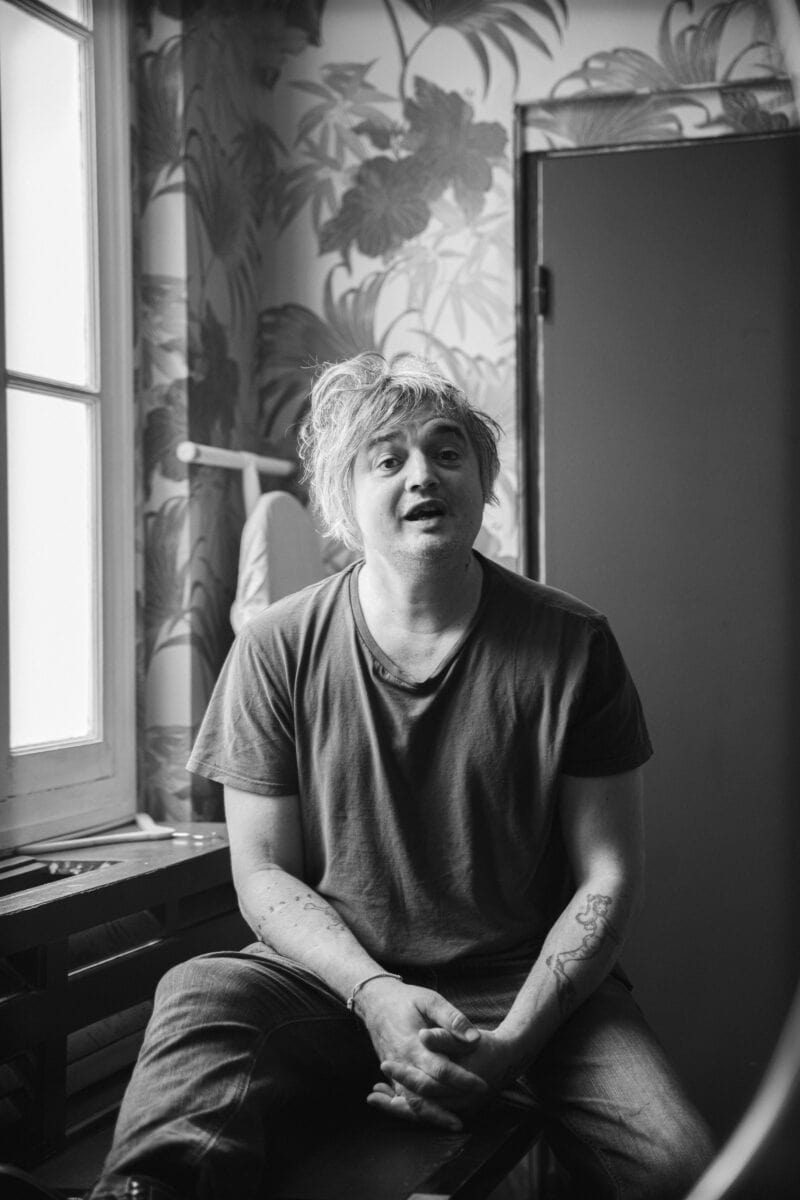
La Face B : Des pépites… d’or ?
Peter Doherty : Oui. De l’or pur. De l’or massif.
La Face B : Je crois que tu es un poète honnête, libre, sincère… et peut-être romantique aussi.
Peter Doherty : J’adore ce mec ! (Il se lève et me serre dans ses bras)
La Face B : Qui est, pour toi, ton modèle artistique ultime ?
Peter Doherty : Voilà, ça c’est une question compliquée. On parle souvent de la « cancel culture » aujourd’hui, tu vois ? Si tu me demandes quel est mon cinéaste préféré, et que je réponds Woody Allen, on finit forcément par parler d’autre chose que de cinéma.
Le premier nom qui me vient, c’est Hunter S. Thompson. Je lisais ses lettres récemment, elles sont incroyables. Mais… maintenant j’ai peur de le dire. J’ai entendu des trucs. T’as entendu quelque chose, toi ?
La Face B : Non. Quoi ?
Peter Doherty : Je ne sais pas. Et franchement, je n’ai même pas envie de savoir. Je veux pas googler. Tu comprends ?
La Face B : Tu veux éviter la déception ?
Peter Doherty : Oh, il m’a déjà déçu. C’est pas pour ça que je le considère comme un ange. C’est un vrai connard par certains côtés. Mais… ce que tu disais sur le « profil » du personnage, c’est ça. Il était unique, écrivait tout le temps. Il était à la fois fasciné et perdu dans sa vision de l’Amérique, de la politique américaine — surtout à l’époque de Nixon. Il aimait aussi la musique, la littérature, la poésie… Et bien sûr, il était obsédé par l’excès : l’alcool, les drogues, le café. J’aime ça.
C’est cette image que j’aime : un mec défoncé au speed, au rhum, enfermé dans une chambre d’hôtel à taper un roman… puis qui part tirer sur des buffles, vendre des chiens à des actrices, ou traîner avec les Hell’s Angels. Mais voilà, il y a sans doute eu des trucs pas nets. Peut-être une histoire de mineure. Tu sais, aux États-Unis, selon les États, une fille de moins de 18 ans, c’est du viol statutaire. Frank Sinatra a été arrêté pour ça. La fille avait 17 ans. Tu sais, moi, à 17 ans, c’était les filles qui me faisaient flipper à ce sujet. Elles en savaient plus que moi, je crois. Elles aussi savaient ce que c’était.
La Face B : Merci pour cette interview. C’était un très beau moment, un grand honneur.
Peter Doherty : Vraiment ? Merci à toi.
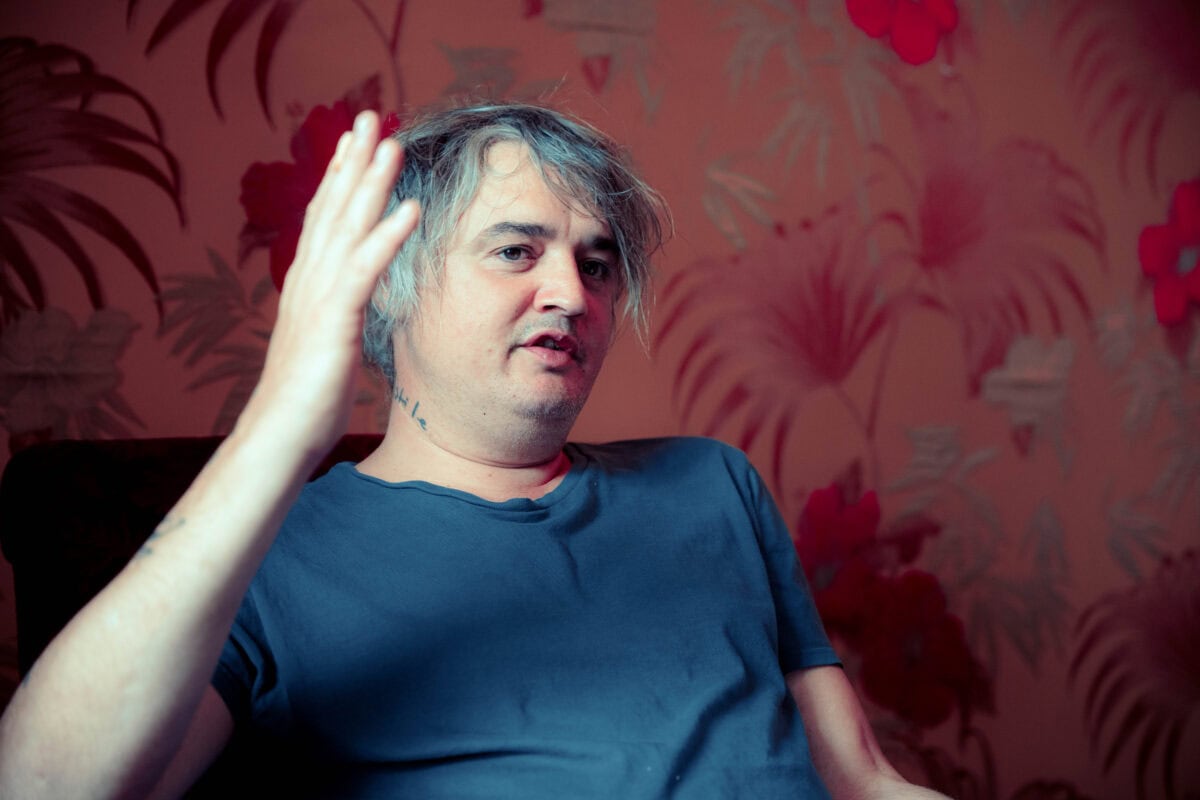
ENGLISH VERSION
La Face B : Hi Pete, first things first, how are you doing?
Pete Doherty : I’m very well indeed actually. I’m feeling like an exquisite joy to be in this amazing place and to be trying again to stand up in front of Paris. And show them what we’ve got with Mr Mike Joyce, of course, on drums tonight. It’s a magical dream.
La Face B : Your album is called Felt Better Live. Would you say that sums up where you are in life right now? Are you living your best days?
Peter Doherty : It’s hard to know, isn’t it? It’s hard to know for anyone in your life, comparing yourself. How do you feel about your life ten years ago? Are you living your best days?
La Face B : I think I’m living my best days right now. But maybe ten years ago, I was also thinking that I was living my best days. But you, today you’re maybe more in shape.
Peter Doherty : I see. Physically, I’m not enough in shape. But better shape, yeah. In some ways, in many ways, yeah. I don’t want to well on these things. What else have we got?
La Face B : Each song reflects a part of your new life. You pay tribute to Normandy.
Peter Doherty : Yeah. You’re right, actually.
La Face B : How has this environment changed the way you’ve created it? Have you become a hard fan of it?
Peter Doherty : Yeah. It’s just there, isn’t it? I don’t know. Yeah, I live in Normandy. I have done for a while. And I fell in love with the place, like I have with all of France. The guy at the last interview, he was just asking me about this. He actually said to me, Did France save you? It’s a bit of a heavy question. I think so. It doesn’t really change the way I create, though, I don’t think. I see the world, I’m quite locked into my…
La Face B : Because you’re always lived in a big city like Paris.
Peter Doherty : Yeah. But the newspapers I read and the news I consume, I could be anywhere in the world maybe a lot of the time. But when I leave the house, it’s definitely a very specific area. Especially for the dogs as well. It’s so beautiful, so peaceful, isn’t it? But it doesn’t really change the way I create. I mean, I sit down on the guitar, have a pen, and that’s it. Evidently, a lot of these songs are about the heart of guitar. Normandy, Calvados is basically a love song, isn’t it? In a way.
La Face B : In The day the Baron Died, who is the Baron? Is it the same Baron as the Song of Libertines?
Peter Doherty : Not… Not really. Actually, the Libertines‘ Baron has a more sinister edge, I think. He’s become more of a historical character. Me and Carl tried to write a radio play about this Baron. But the original Baron was not really a lot of anecdotal or criminal or historical interest in him. He’s just a Baron who lived in an old house on the edge of a cliff. And no one really could prove, one way or the other, who he was, where he came from. It was strange, especially in this world of digital manifestation of society, and being able to find out everything you can about people just by hacking into their phone. You couldn’t do that with the Baron. He had no digital footprint. He’s not finding his place?
La Face B : He’s not finding his place in this world?
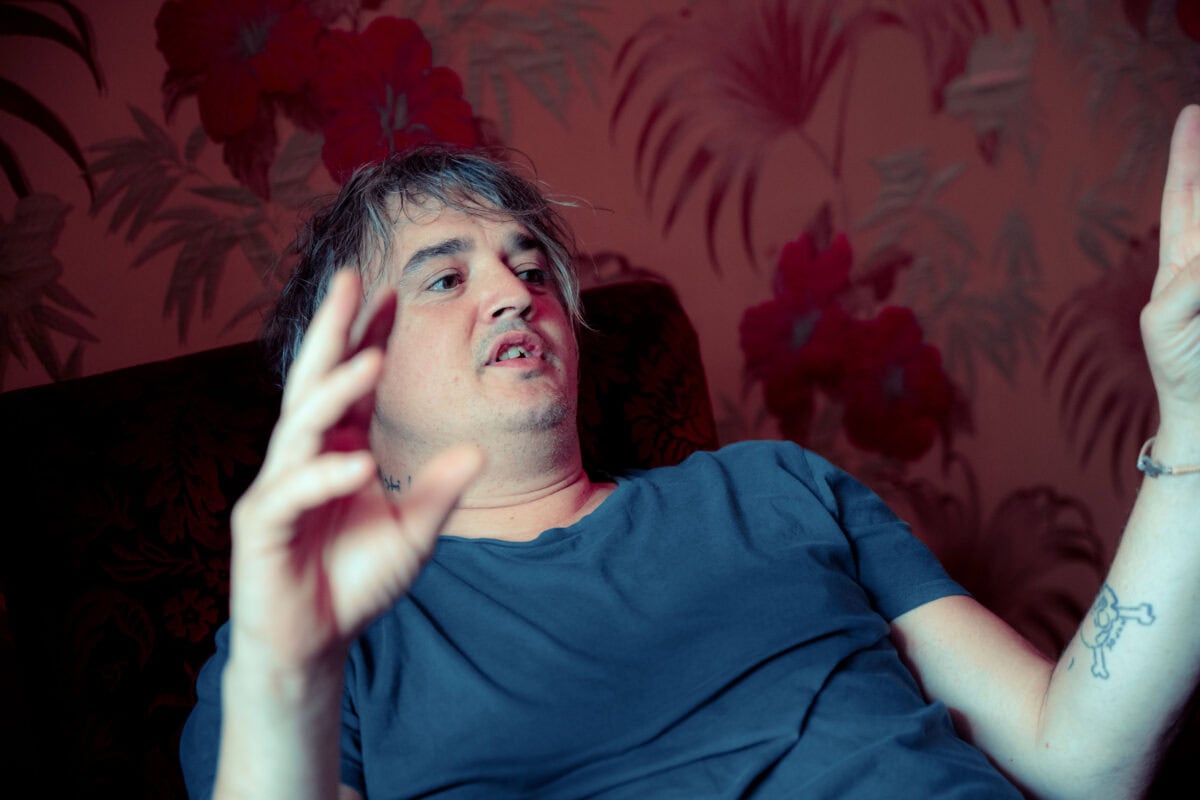
Peter Doherty : He’s found his place, but the world can’t place him. People are interested to know who he is and why, but when they get to the gates, when they actually get to the gates, they anger, they can’t. Very few people can actually go through and find out who he is, because you don’t want to really know, actually.
La Face B : He doesn’t want that people know him?
Peter Doherty : Yeah, he’s always done everything he can to help people. He’s always there, he’s interested in casual flirtation with everyone.
La Face B : So this is you, the Baron?
Peter Doherty : No, but you know what, I’m starting to think that. I’m starting to believe that (rires). Yeah, I might start running with that one.
La Face B : Okay, let’s play a quick true or false game, and you tell me why. Pot of Gold is a tribute to your daughter.
Peter Doherty : True. It’s pretty self-explanatory. It’s a take on the Mockingbird song.. (he sings the song) Papa’s gonna buy you a mockingbird. See, I changed the word a little bit. I kept the melody.
La Face B : Ed Belly is a cheeky nod to your weight ?
Peter Doherty : Ah, yeah. Basically, yeah. True (rires)
La Face B : Empty Room is about your fear of loneliness ?
Peter Doherty : No, it’s the opposite. It’s about wanting to find five minutes on your own, I think. No, no, no, no. I don’t think I have fear of loneliness. I believe in community. I believe in the bonds between people with two souls. I think it’s important to be on your own. I think everyone has the idea of the Robinson Crusoe thing, of this actual physical loneliness. It’s impossible nowadays. It’s impossible. I know Desert Island is left. There’s a film as well with Tom Hanks. It’s a beautiful idea. This story breaks my heart. Especially because he was a postman. Yeah, exactly. And he was so efficient. This guy, he was punctual. He was concerned about his deliveries.
La Face B : This is something that you are dreaming to be on an island?
Peter Doherty : I don’t think about this. It’s like the popularity of these survival shows. You have to survive on the island. It’s how we did it for hundreds of thousands of years. We had to fish and hunt and make our own way. It’s a fantasy now. The idea of post-apocalyptic films. When society finally does come crashing down. I think we had a tiny taste of it for about two minutes during the pandemic. When the cities were deserted. Then you think, how long would it take for a tree to grow out of a motorway? Because nature comes back pretty fast. Even though it’s concrete, it comes back fast.
La Face B : Do you think you will be a good survivor in the apocalypse?
Peter Doherty : She will. Yes, for sure. (rires)
La Face B : After all these years in France, do you feel more French than British?
Peter Doherty : Not really, not so much. Because my French isn’t brilliant. But I think I’m happy with that. For example, when I go and sit with a dog somewhere. I do quite a lot. I like not being able to understand everything. I like being like that, I like that. That’s what I like about it. I always try to communicate. But I still feel a little bit of an outsider. And yet I’m so connected. It’s my life, it’s my family. My daughter’s French now, thank you. (he throws his banana in the garbage). I don’t know. Do you know when you feel French? I don’t know. See, I’m British, I’m English, I’m born there. It made me… I feel like one of the most English people I know. It made me get more English by living in France. Yeah. There’s a certain type of English.
La Face B : You keep the spirit English, but you live like a French guy now.
Peter Doherty : Ish. I wouldn’t generalise French. French men are quite a difficult breed to generalise about. I think the French male identity is quite strong.
La Face B : In which way?
Peter Doherty : I don’t want to start analysing it too much. Because I’ll end up saying something I regret.
La Face B : Don’t worry, French people will not blame you.
Peter Doherty : No, no, no, I don’t mean it in an insulting way. I don’t think anyone ever would think I was French. Say there was a group of kids. Eight, nine year old kids. I’d study this guy, watch him, listen to him for 30 seconds. And tell me where I was from. I don’t think I could convince anyone that I was French. Even if I started speaking French. So if you were a ten year old French kid and I said to you : « Excusez-moi. » « Qu’est-ce que tu penses? Je suis Français ou pas? » What would they say? What would they think?
La Face B : Ten years old, maybe you could convince them. Who is joining you on stage for this tour apart Mick Jones of The Smith ?
Peter Doherty : Mike Jones. Can you imagine? (he repeats) Can you imagine? Mike Jones from The Smiths. Soundchecking at a tour at Paris. He’s got quite a light touch. He’s a beautiful drummer. He’s got a real joy when he plays. He closes his eyes and he smiles. Its been a while since he played the drums as well. In a band. He’s loving it. He’s a joy for me. We didn’t even get to rehearse because I was in Australia with the other two. He shows really his talent. Maybe we should have rehearsed, but I don’t know. He likes the chaos but it’s not chaos. There’s an element of that, but it’s not. Unpredictability. He likes to do it just for the fucking joy of playing. He loves the songs. He told me that.
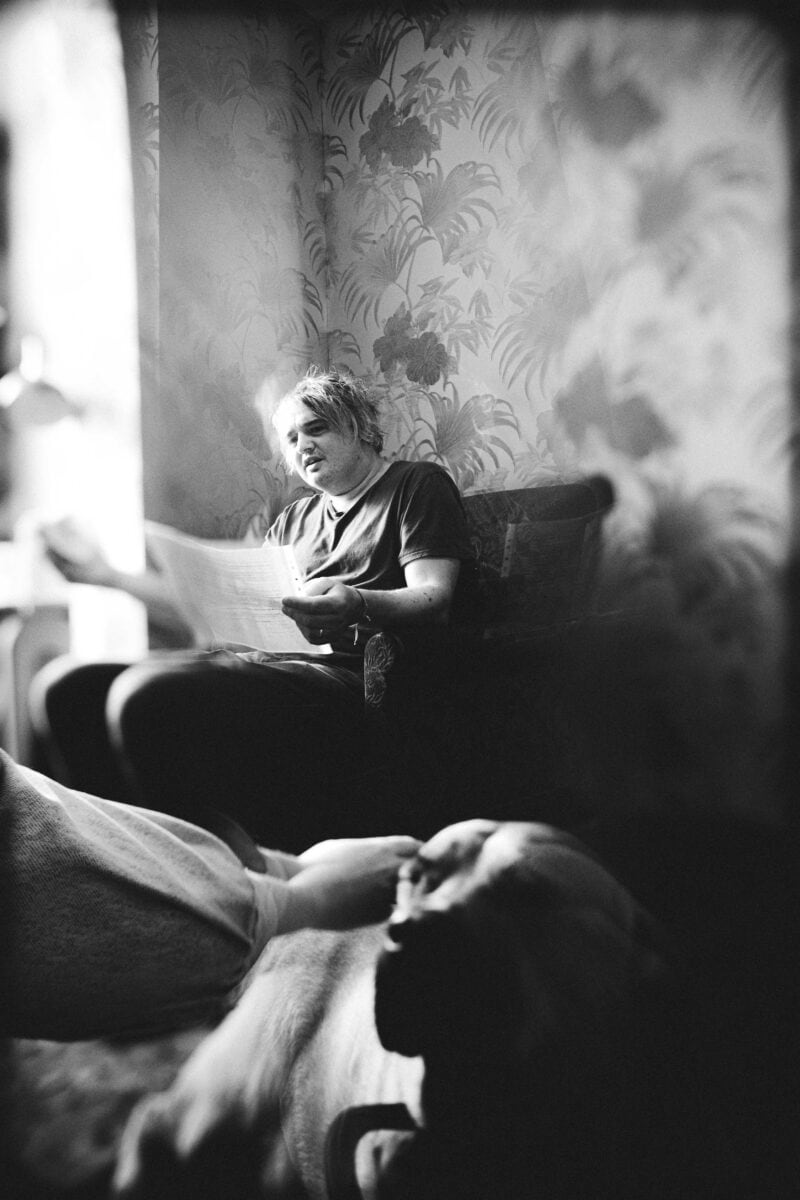
La Face B : If not, he would not be there. It’s kind of challenging for him also, maybe.
Peter Doherty : Right. I don’t know. I feel like I love him. I don’t really know him, but he was on my wall. You know what I mean? When I was a teenager, he was on my wall. He doesn’t really know someone, but I feel like I know his soul.
La Face B : Which song from The Smith would you like to sing?
Peter Doherty : I don’t know. I’m just singing all of them all day. I just keep singing at him. So we’re going to run through a few as well.
La Face B : To finish, you had a profile of a bad boy, but the public, the fans, have always loved you. So do you know why all these years, all these people continue to support you?
Peter Doherty : (he takes a very long time to think) I’m thinking. I’m trying to think of a question. I feel like I have a question. I feel like I have a connection with my music. (long silence) I’m allowed to take time to think. This is a broad question ! It’s just a beautiful thing to share in this. The most precious thing is melody and love. And then all the rage and all the anger and confusion and panic of the world and all the beauty and grandeur. People love music and celebrating it and reaching people with your music. There’s a certain connection,
I think, with French people in particular as well. I always love letters that beautiful, elegant handwriting French stamp. You get a letter from Nîmes. Some lost soul in Nîmes, giving their life to books and music and art. And they’re living in this dusty street. In the middle of France. And you reach them with a song. Somehow you’ve connected with them. And just for that brief moment, that one moment, they’ll send you a little snapshot like a Polaroid of a letter. Expressing something so powerful and magic. And then it’s gone. It’s gone, they’re gone. They go and live their life.
It’s weird. I went to the Alfa-Rambo museum. They’ve got this AI version of Alfa-Rambo on a screen. It’s an AI programme of Alfa-Rambo. He’s given all the information of his life. And then all the historical context of everything that’s happened after he died. So he knows what everyone thinks of him, what he did. And I asked him about his poetry. And he said, don’t talk to me about that. Don’t talk to me about that shit. I was a foolish, stupid, vainglorious child. And poetry and literature, and in particular, literary crits and analysis are no use to mankind. I want to build bridges and dams and farms and railroads. And I want to design tubes for transferring gunpowder from underground. He was like, okay. He moved on. I don’t think I moved on.
I think I’ve stayed in love with what I always was in love with. And people like it at the beginning, still see the same thing as I still see it. And as you comment about your life, it’s interesting. But for some of us, it’s the most precious thing to go out and mine it. And then dig it up. And then scatter it about. Nuggets !
La Face B : Nuggets…. Gold nuggets?
Peter Doherty : Yeah. Full gold. Full gold.
La Face B : Okay. I think that you are an honest, free-spirited, genuine and maybe romantic poet.
Peter Doherty : Hey, I love this guy (he stands up and gives me a hug)
La Face B : Who is, for you, your favourite artistic model?
Peter Doherty : Right. This is a problem, this question, you see. He’s not always talking about it, but when we sit up and we discuss things, he talks about council culture. Do you know what I mean? So, say you asked me what my favourite filmmaker was, and I said Woody Allen.
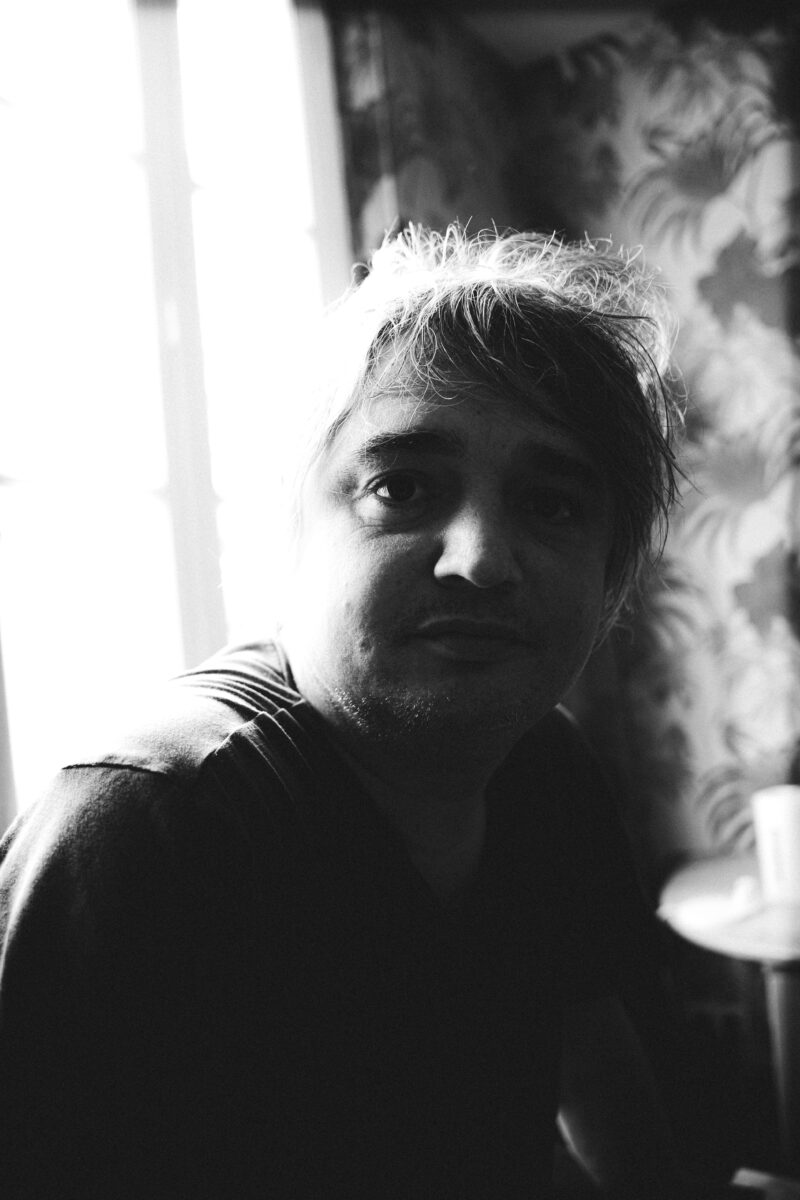
Now, you can’t really say that. Because we can sit and talk about Woody Allen films, but probably eventually we’ll end up talking about something else. So, when you asked me that question, my first answer is Hunter S. Thompson, you know? I was reading his letters and they’re incredible, but… I’m scared to say it now, because I’ve heard something about him. No? Did you hear anything?
La Face B : No, what?
Peter Doherty : I don’t know. I don’t even want to talk about it or think about it, really. But, I mean, I don’t even want to Google it. You know what I mean?
La Face B : You don’t want to be disappointed by him?
Peter Doherty : No, he disappoints me all the time. He’s already disappointed me. Just because I admire his writing doesn’t mean, like, I think the guy’s an angel. He’s a fucking arsehole in a lot of ways. But, I love… You talked about the profile of the character. You know, this is like… He was just out there. So prolific.
You know what I mean? Writing, writing, writing. And fascinated and lost in his visions of America and American politics. In particular, that era, like the Nixon era. And he also had this mad interest in music and literature and poetry. And then, of course, he was obsessed with excess. You know? Libation. You know, alcohol, drugs. He was fascinated with it. Coffee. I like that.
You asked about the profile. I like that vision of him. Just this guy that’s been freaked out on speed and coke and rum in a hotel room. Banging out a novel and then going out and, like, shooing a buffalo or something. And selling dogs to actresses. And hanging out with Hell’s Angels. Yeah. It’s probably like an underage… It might be like an underage girl thing. I don’t know. Something like that.
But the thing is, in some states in America, if you’re under 21, do you know what I mean? In some states back then, if a girl was under 18, it can be classed as statutory rape.
Do you know what I mean? Frank Sinatra, he went and got arrested for statutory rape because she was… Do you know what I mean? 17.
Do you know what I mean? I was terrified. When I was 17, it was the girls that used to get down to statutory rape.
Do you know what I mean? They probably do as well. Do you know what I mean?
La Face B : Thank you for this interview. It’s a great moment. It’s a big honour.
Peter Doherty : Really ? Thank you so much
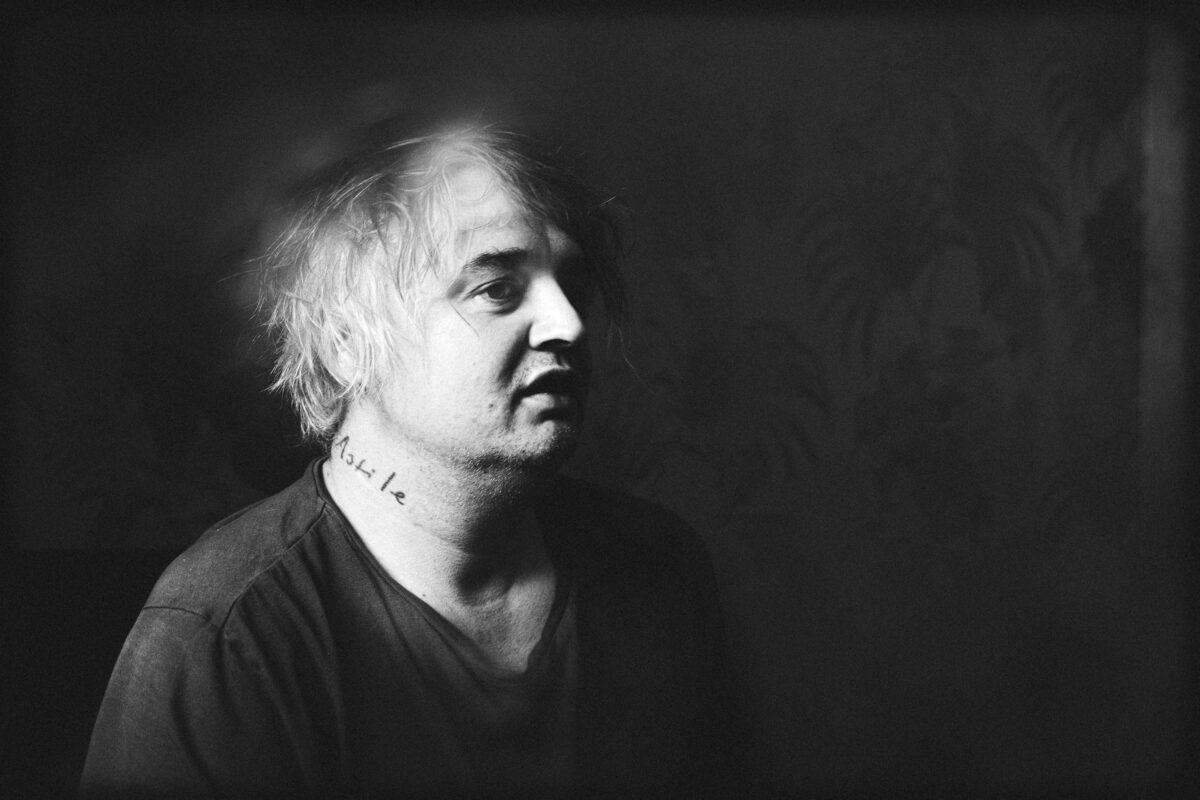
Crédit photos : ©Félix Hureau Parreira
